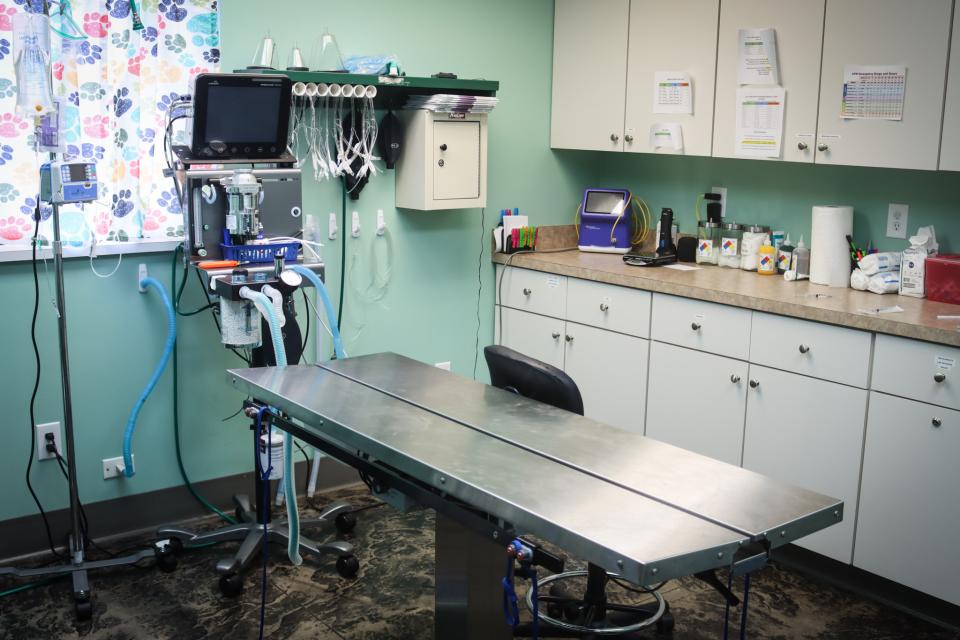
At Pine Hollow Veterinary Services, we provide a wide variety of surgical procedures. The safety of our patients is our highest priority. Our patients deserve the best care out there, so our highly trained staff will perform a pre-surgical examination, an EKG, and run an extensive blood work panel so that we may choose the best anesthetic protocol for each individual patient. All of our surgical patients are provided with the most state-of-the-art monitoring equipment that our surgical technician will control and monitor. Postoperatively, your best friend will be resting comfortably in our quiet, cozy recovery room. If you have any questions, please do not hesitate to call and set up a surgical consultation with us.
Some of the procedures we offer include:
- Spays and neuters
- Soft tissue surgery such as mass removals, bladder stone surgeries, laceration repairs, exploratory surgeries, and foreign body removals.
There are a couple of things to keep in mind before your pet has a surgical procedure at one of our veterinary practices:
- Food and water: Do not give your pet food after 10pm the night before surgery, but allow them access to water. We ask this to minimize the risk of vomiting and possible aspiration pneumonia during the procedure. Because water does not take as much time to “digest”, it is alright to let your pet drink water up until you leave for the hospital.
- Medication: Let us know if your pet is taking any medications and if they should continue taking them around the time of surgery.
- Cleanliness: Make sure your pet is clean and dry. If your pet has a tangled or matted coat, consider grooming them a few days before surgery. Your pet may come home with some of their fur shaved depending on the surgical procedure.
- Abnormalities: If your pet has any abnormality or condition since their last vet appointment, let your us know.
- Vaccinations: Now is a good time to make sure all vaccinations are up-to-date.
- Microchip: If your pet doesn't have a microchip, now is a good time to get one.
- Pre-anesthetic testing: Your pet will have pre-anesthetic bloodwork and ECG screening to ensure your pet is healthy for surgery.
- E-Collar: Depending on the type of surgery, we may recommend an e-collar or doughnut collar to prevent your pet from licking or chewing their incision. If you have one at home that fits and serves its purpose, please bring it when you get your pet at discharge and let the staff know at admission.
- Transportation: Make a plan for getting your pet to our office on the day of surgery.
- Surgical Forms: We will have presurgical forms to complete on the day of the procedure. If you are not bringing your pet, please make sure whomever can answer all questions for the presurgical forms.
What to expect on the day of the surgery:
- Contact: Please be accessible all day for our staff to be able to contact you. Our staff may have to reach you before, during, or after surgery. Having your phone on and letting your employer know you will be getting a call from your vet is important for us to reach you.
- Post-surgery Call: One call you will receive from our staff is that your pet is out of surgery and in recovery. At this time our staff will go over surgical questions and will plan to set up a time for discharge.
- Are you allowed to call the clinic during your pet’s surgery?: ABSOLUTELY! We understand your concerns and will answer your questions about your pet as to where they are during their surgery day.
What can you do to prepare for when your pet comes home from surgery:
- Recovery: Set up a quiet and comfortable place for your pet to recover.
- Transportation: Make a plan for getting your pet picked up from our clinic based on the discharge time discussion with our staff. Please make sure you have made arrangements in case you need assistance getting your pet out of your vehicle at home.
- Leash walking your dog: You may be asked to leash-walk your dog to prevent it from running or excessive playing outside.
- Nutrition: You may be asked to slowly introduce your pet’s normal meals for a day after surgery, or feed small meals consistently.
- Cat Litter: Depending on the procedure, you may be asked to change your cat’s normal litter to shredded paper to prevent clay or other substances from contaminating the incision.
- Defecation: Please remember that your pet has not eaten a normal meal in close to 24 hours. Your pet will take some time to get back into their normal defecation routine.
- Discharge Instructions: You will be sent home with discharge instructions detailing specific care instructions tailored to your pet’s post-operative needs. Our staff will review those at discharge. If you get home and you have questions, please call our clinic, even if after clinic hours.
- Your observations of your pet: Most importantly, if anything looks irritated, infected, or otherwise concerning do not hesitate to let us know! You know your pet best!
